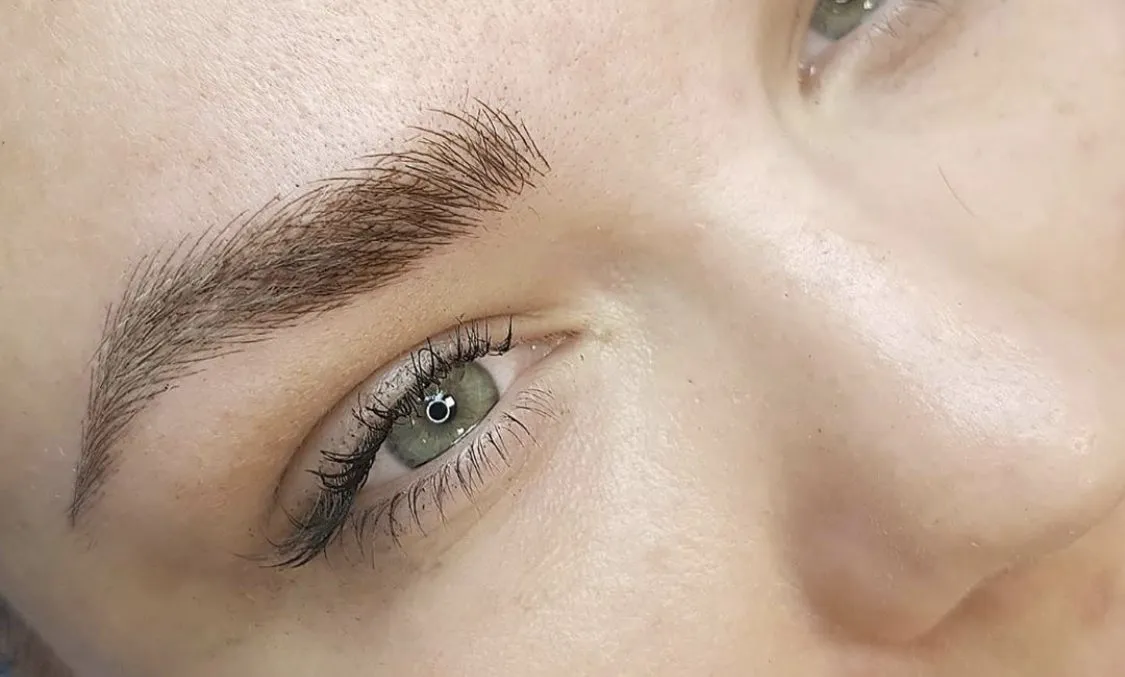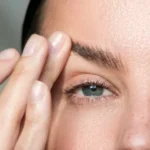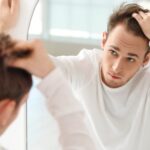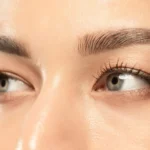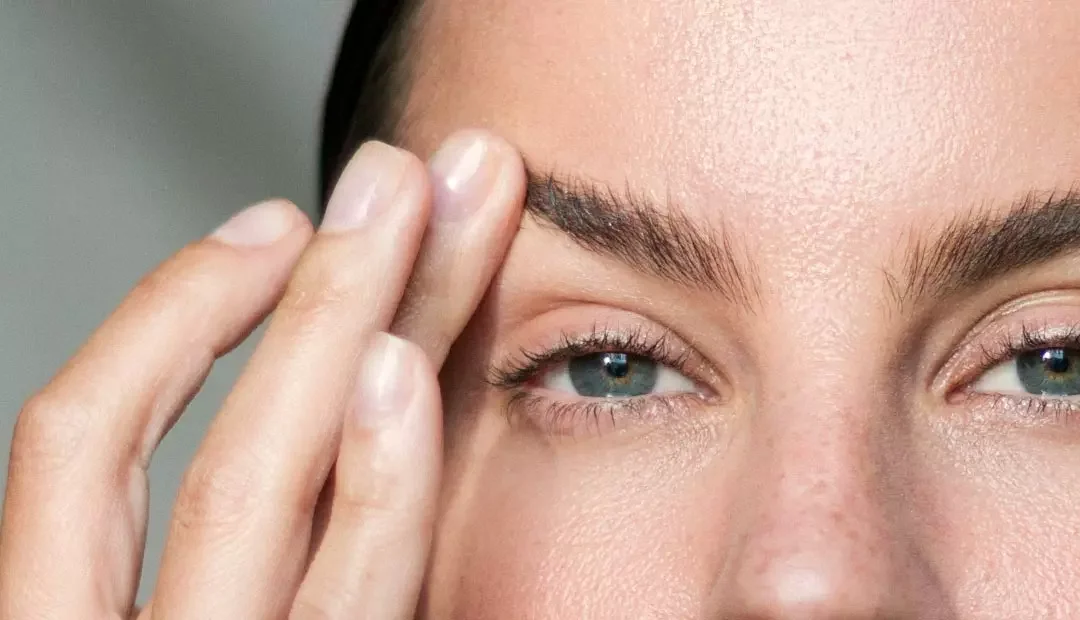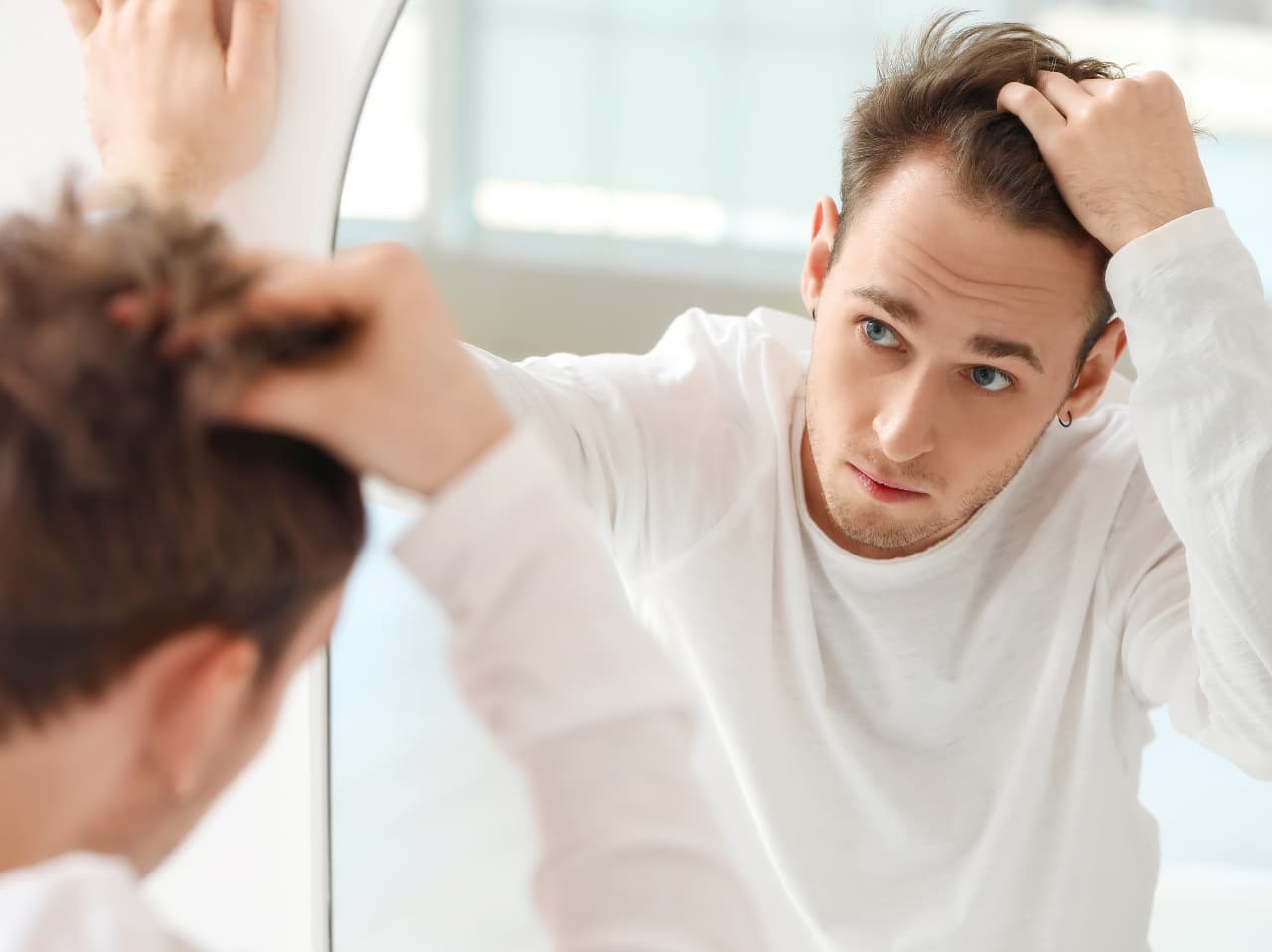Table of Contents
ToggleSteroids are commonly used for medical and athletic purposes, but their impact on hair health is a frequent concern. Can steroids cause alopecia? Yes, in many cases, steroids can disrupt the hair growth cycle and lead to hair thinning or balding. This guide will explain how steroids affect hair, the risks involved, and potential hair loss treatments.
In this article, we will look at:
- Which steroids can trigger hair loss
- How steroids cause loss of hair
- Prednisone and hair loss
- Steroids and loss of hair in women
- Ways to prevent steroid-related hair loss.
Understanding the Link Between Steroids and Hair Loss
Steroids, particularly anabolic steroids, can contribute to hair loss by increasing dihydrotestosterone (DHT) levels. This hormone damages hair follicles, leading to hair thinning or permanent loss in those predisposed to male pattern baldness or other forms of alopecia.
How do Steroids Cause Balding
Steroids can lead to hair thinning, especially in those with a family history of hair loss. They may also cause alopecia areata. This is an autoimmune condition where the immune system attacks hair follicles. This results in patchy hair loss.
Can Steroids Cause Hair Loss in Women?
Do steroids cause hair loss in females? Yes, especially anabolic steroids and high doses of corticosteroids. These drugs can trigger female pattern hair loss or telogen effluvium, depending on the dosage and individual response.
Women may experience diffuse thinning or hair loss patterns similar to male pattern baldness due to elevated DHT levels. Prednisone and hair loss are particularly linked through telogen effluvium, a temporary condition caused by disrupted hair growth cycles.
Is Hair Loss From Steroids Permanent?
It depends on the type of steroids used and the kind of hair loss. Hair loss from telogen effluvium caused by corticosteroids is usually temporary and resolves after stopping the medication. However, androgenic alopecia caused by anabolic steroids can result in permanent balding unless treated with hair loss treatments like finasteride, minoxidil, or a hair transplant.
Are you more of a visual learner? Check out our video on why steroids affect your hair.
How Steroids Impact Hair Health
The type of steroids you use greatly influences their impact on hair health. Synthetic versions like anabolic steroids and corticosteroids affect hormonal levels, which can lead to hair loss or thinning.
Worst Steroids for Hair Loss
Anabolic steroids, such as Dianabol and Winstrol, are among the worst for causing hair loss. Dianabol hair loss is common due to its strong androgenic activity that boosts DHT levels and damages hair follicles. These synthetic versions of testosterone increase DHT levels, shrinking hair follicles and accelerating hair thinning. Even lower-androgenic steroids, such as Anavar, can lead to hair loss in genetically predisposed individuals.
Can Prednisone Make You Lose Your Hair?
Prednisone is a corticosteroid commonly prescribed for individuals with low corticosteroid levels due to conditions like arthritis, lupus, and multiple sclerosis. It is also used to manage issues affecting the lungs, skin, eyes, kidneys, blood, thyroid, stomach, and intestines. As a synthetic steroid, prednisone replaces naturally produced steroids in the body.
Hair thinning is a rare side effect of prednisone. Interestingly, in some cases, prednisone has been associated with hair growth, which may depend on how the medication is administered, such as via tablets or injections.
Prednisolone, a medication in the same drug class as prednisone, functions similarly but differs in dosage methods and drug interactions. Like prednisone, prednisolone has also been linked to hair thinning in certain cases.
Research indicates that both prednisone and prednisolone can be effective in treating alopecia areata, an autoimmune condition where the immune system attacks healthy hair follicles. This autoimmune disease often responds well to corticosteroid treatments.
One study explored the combination of prednisone and 2% minoxidil in patients with alopecia areata. Results after six weeks showed that 47% of participants experienced up to 25% hair regrowth when using this combination therapy.
The side effects of prednisone, including rare instances of hair thinning, should be discussed with a healthcare provider to determine the best treatment plan for individual needs.
Preventing Hair Loss While Using Steroids
Although steroids can lead to hair loss, certain measures can help you maintain healthy hair while using them.
Does Finasteride Prevent Hair Loss From Dianabol?
Yes, finasteride can help reduce hair loss caused by Dianabol and similar anabolic steroids. This medication blocks the enzyme that converts testosterone into DHT, reducing its harmful effects on hair follicles. However, it doesn’t eliminate DHT completely, so hair thinning may still occur to a lesser extent.
Tips for Minimizing Hair Loss on Steroids
- Choose Low-Androgenic Steroids: Opt for compounds like Anavar, although anavar hair loss can still occur in genetically sensitive individuals.
- Use DHT Blockers: Medications like finasteride or minoxidil can slow hair loss.
- Limit Dosage and Duration: Lower doses and shorter cycles reduce the likelihood of triggering significant hair loss.
- Avoid Stacking: Using multiple steroids simultaneously increases the risk of severe side effects, including hair loss.
Curious about how DHT Blockers Work? Check out our comprehensive article.
Lifestyle Adjustments to Protect Hair Health
- Maintain a Balanced Diet: Include foods rich in biotin, zinc, and iron to promote hair growth and maintain healthy hair.
- Reduce Stress: High-stress levels can lead to hair loss. Incorporate relaxation techniques like yoga or meditation to combat this.
- Use Gentle Hair Products: Avoid harsh shampoos or treatments that weaken hair strands. Opt for sulfate-free shampoos and nourishing treatments. Caffeine-infused hair growth shampoos may be effective. Studies indicate that topical caffeine solutions show better results when applied for extended periods.
- Stay Hydrated: Proper hydration supports scalp health and strong hair follicles.
Ever wonder which are the Worst Shampoos That Cause Hair Loss? Take a look at our picks.
Understanding and Managing Steroid-Related Hair Loss
Steroid use, whether for medical or athletic purposes, can lead to hair loss due to hormonal changes or autoimmune conditions. Understanding the type of steroids and their side effects is essential to managing these risks.
Men with existing signs of hairline recession or thinning crowns, typically measured using the Norwood Scale, may notice faster progression when using anabolic steroids.
Preventive measures, including DHT blockers, healthy lifestyle choices, and professional advice, can help protect hair health. If hair loss occurs, early intervention with treatments or procedures can aid recovery and maintain confidence.
Common Questions Answered
What do steroids do to your body? The anabolic types, especially, boost muscle growth by increasing androgen levels. This hormonal shift can trigger hair thinning in some individuals.
Does Winstrol cause hair loss? Yes. Winstrol hair loss is a reported side effect, particularly in people with a genetic tendency toward male pattern baldness.
Does Dianabol cause hair loss? Yes, it is known to raise DHT levels, which can damage hair follicles.
Which steroids cause hair loss the most? High-androgenic ones like Trenbolone, Dianabol, and Winstrol are most commonly linked to hair shedding.
Does Trenbolone cause hair loss? Yes. Trenbolone hair loss is a frequent concern because of its strong androgenic profile.
Does steroids make your hair fall out? It can, when they increase DHT, especially in people prone to androgenic alopecia.
Does steroids cause baldness? Steroids can cause baldness by speeding up hair loss in those with a genetic predisposition. The loss may be permanent if not addressed early.
Does steroids make you lose hair in all cases? Not always. Mostly when using androgen-heavy compounds or if you have a family history of baldness.
Have you noticed hair loss from using steroids?
If steroid-related hair loss is impacting you, consider consulting a doctor to identify any underlying health conditions. Consider speaking with Dr. Kopelman. This father-son team has more than 35 years of experience in hair restoration.
They focus on personalized treatments for every client. Dr. Kopelman’s expertise can help you find the right solution tailored to your unique needs. Schedule a consultation today to explore your options and take the first step towards achieving your hair goals.
FAQs About Steroids and Hair Loss
How Do You Prevent Hair Loss While on Steroids?
Prevent hair loss by using DHT blockers, avoiding high-androgenic steroids, and maintaining a hair-friendly lifestyle. Consult a healthcare provider for personalized advice.
Is Hair Loss a Side Effect of Steroids?
Yes, hair loss is a common side effect of steroids, particularly anabolic steroids, which increase DHT levels, and corticosteroids, which disrupt hair growth cycles.
Can Topical Steroids Cause Hair Loss?
Topical steroids are often used to treat autoimmune diseases like alopecia areata. However, prolonged use can weaken hair follicles and lead to localized hair thinning. Always follow medical guidance to minimize risks.
Do Steroids Make Your Hair Fall Out?
Yes, anabolic steroids and corticosteroids can both lead to hair loss. While anabolic steroids increase DHT, causing male pattern baldness or permanent hair loss, corticosteroids like prednisone often result in temporary shedding as a side effect.
Will Hair Loss From Steroids Grow Back?
Whether hair loss from steroids grows back depends on the cause. Hair loss from telogen effluvium is temporary and resolves within months of stopping steroids. However, hair loss from androgenic alopecia may require treatments like finasteride, minoxidil, or advanced options like a hair transplant.



